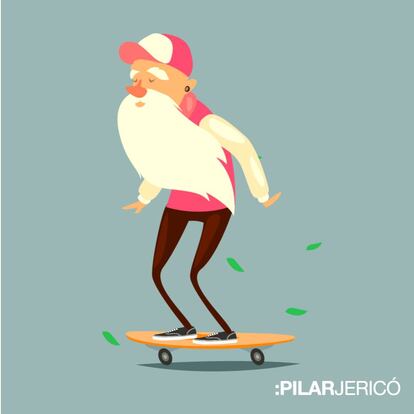Three keys to turning longevity into a gift for life
Make decisions geared toward reinventing yourself, plan and experiment, and keep your passion for learning alive

Human beings are living longer and longer, and this new longevity can either be a gift or a curse, depending on what we do about it now. At least, this is the conclusion of two London Business School professors, Andrew Scott and Lynda Gratton, authors of The 100-Year Life, which has won the Best Book of the Year award given by Spanish knowledge network Knowsquare. This advice stems from an irrefutable fact: life expectancy has increased, so much so that a child born in the Western hemisphere has more than a 50% chance of living to be 105 years old. Just a century ago, this figure was just 1%. In addition, the incorporation of new technology in the realm of healthcare will help us to see more birthdays and even find a “cure” for old age, according to José Luis Cordeiro and David Wood in their thought-provoking read, The Death of Death.
There are no former models to look to during these stages, so we must take this opportunity to reinvent ourselves
Beyond being able to guess how long we’ll get to live, it seems pretty clear in broad terms that we will surpass our parents’ life expectancy and our children will surpass ours. Because of this, if we are going to enjoy more time with better health, what can we do to enjoy a fulfilled life for the rest of the years we have left? Andrew Scott and Lynda Gratton suggest that, regardless of how old we are, we should revisit our vital decision-making agenda in its three main areas:
Reinventing ourselves in different stages of our lives. Longevity opens new vital phases, the same way it did during the 20th century. Until then, neither adolescence nor retirement had existed, everything was simply continuous. There are other stages now, such as the one between 18 and 30, the years characterized by, for example, not taking on the same responsibilities our parents had; or the ones that make up our senior years. There are no former models to look to during these stages, so we will have to reinvent ourselves using these two questions: Who am I? And, how am I going to live? This means that we can’t expect to do things the same way every time, and that we have to give ourselves permission to live by doing things differently.
Plan and experiment. Longevity will see us face greater economic needs, which will require better financial planning and saving and investing more. At the same time, if we must reinvent ourselves as people in every single one of these phases, we will have to plan in advance. This is going to go hand in hand with putting ourselves out there and experimenting, opening up avenues we’d previously left closed, such as being artists, cooks or teachers – dreams that every one of us has.
Peter Drucker’s hunger to learn allowed him to have an illustrious mind in the world of business and to be a happy man
A passion for learning. The thing that will make us feel alive is a constant positive attitude toward learning. If we believe that the last parts of our life are going to be spent in front of a television, longevity will most likely be a burden rather than a blessing. But if we encourage our desire to learn, foster creativity, enjoy art or questioning our very selves… we will be able to train our minds to be young no matter what our age is. Peter Drucker, the father of management thinking, is only one of the numerous examples of this, dying at the age of 96 after having expertise in areas as different as Japanese floral arrangement or medieval war tactics, among others. His hunger to learn allowed him to have an illustrious mind in the world of business and to be a happy man. The same goes for my friend Josep Gajo, president of the European Court of Arbitration, who, at 79 years old, is an insatiable reader and expert in many other areas of humanities.
Ultimately, living more than 100 years can be a blessing if we start making decisions now, oriented toward giving ourselves permission to reinvent ourselves, to planning and experimenting as well as maintaining our passion for learning. If we do all of this, we will probably be capable of enjoying a meaningful life.
English version by Laura Rodríguez.
Tu suscripción se está usando en otro dispositivo
¿Quieres añadir otro usuario a tu suscripción?
Si continúas leyendo en este dispositivo, no se podrá leer en el otro.
FlechaTu suscripción se está usando en otro dispositivo y solo puedes acceder a EL PAÍS desde un dispositivo a la vez.
Si quieres compartir tu cuenta, cambia tu suscripción a la modalidad Premium, así podrás añadir otro usuario. Cada uno accederá con su propia cuenta de email, lo que os permitirá personalizar vuestra experiencia en EL PAÍS.
¿Tienes una suscripción de empresa? Accede aquí para contratar más cuentas.
En el caso de no saber quién está usando tu cuenta, te recomendamos cambiar tu contraseña aquí.
Si decides continuar compartiendo tu cuenta, este mensaje se mostrará en tu dispositivo y en el de la otra persona que está usando tu cuenta de forma indefinida, afectando a tu experiencia de lectura. Puedes consultar aquí los términos y condiciones de la suscripción digital.








































